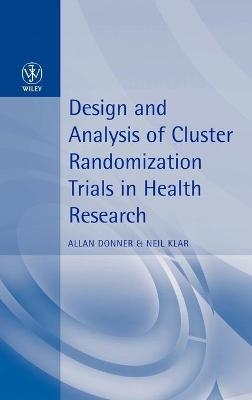
Design and Analysis of Cluster Randomization Trials in Health Research
John Wiley & Sons Inc (Verlag)
978-0-470-71100-2 (ISBN)
Allan Donner is Professor and Chair of the Department of Epidemiology and Biostatistics, University of Western Ontario, Canada. Neil Klar is Senior Biostatician in the Division of Preventive Oncology, Cancer Care Ontario, Canada.
Acknowledgements. Preface.
1. Introduction.
1.1 Why randomize clusters?
1.2 What is the impact of cluster randomization on the design and analysis of a trial?
1.3 Quantifying the effect of clustering.
1.4 Randomized versus non-randomized comparisons.
1.5 The unit of inference.
1.6 Terminology: what’s in a name?
2. The historical development of cluster randomized trials.
2.1 Randomized trials before 1950.
2.2 Cluster randomized trials between 1950 and 1978.
2.3 Cluster randomized trails since 1978.
3. Issues arising in the planning of cluster randomization trials.
3.1 Selecting interventions.
3.2 Setting eligibility criteria.
3.3 Measuring subject response.
3.4 The most commonly used experimental designs.
3.5 Factorial and crossover designs.
3.6 Selecting an experimental design.
3.7 The importance of cluster-level replication.
3.8 Strategies for conducting successful trials.
4. The role of informed consent and other ethical issues.
4.1 The risk of harm.
4.2 Informed consent.
4.3 Subject blindness and informed consent.
4.4 Randomized consent designs.
4.5 Ethical issues and trial monitoring.
5. Sample size estimation for cluster randomization designs.
5.1 General issues of sample size estimation.
5.2 The completely randomized design.
5.3 The matched-pair design.
5.4 The stratified design.
5.5 Issues involving losses to follow-up.
5.6 Strategies for achieving desired power.
6. Analysis of binary outcomes.
6.1 Selecting the unit of analysis.
6.2 The completely randomized design.
6.3 The matched-pair design.
6.4 The stratified design.
7. Analysis of quantitative outcomes.
7.1 The completely randomized design.
7.2 The matched-pair design.
7.3 The stratified design.
8. Analysis of count, time to event and categorical outcomes.
8.1 Count and time to event data.
8.2 Categorical data.
9. Reporting of cluster randomization trials.
9.1 Reporting of study design.
9.2 Reporting of study results.
References.
Index.
| Erscheint lt. Verlag | 28.7.2000 |
|---|---|
| Verlagsort | New York |
| Sprache | englisch |
| Maße | 169 x 243 mm |
| Gewicht | 454 g |
| Themenwelt | Mathematik / Informatik ► Mathematik |
| Medizin / Pharmazie ► Medizinische Fachgebiete | |
| Studium ► Querschnittsbereiche ► Epidemiologie / Med. Biometrie | |
| ISBN-10 | 0-470-71100-0 / 0470711000 |
| ISBN-13 | 978-0-470-71100-2 / 9780470711002 |
| Zustand | Neuware |
| Haben Sie eine Frage zum Produkt? |
aus dem Bereich


